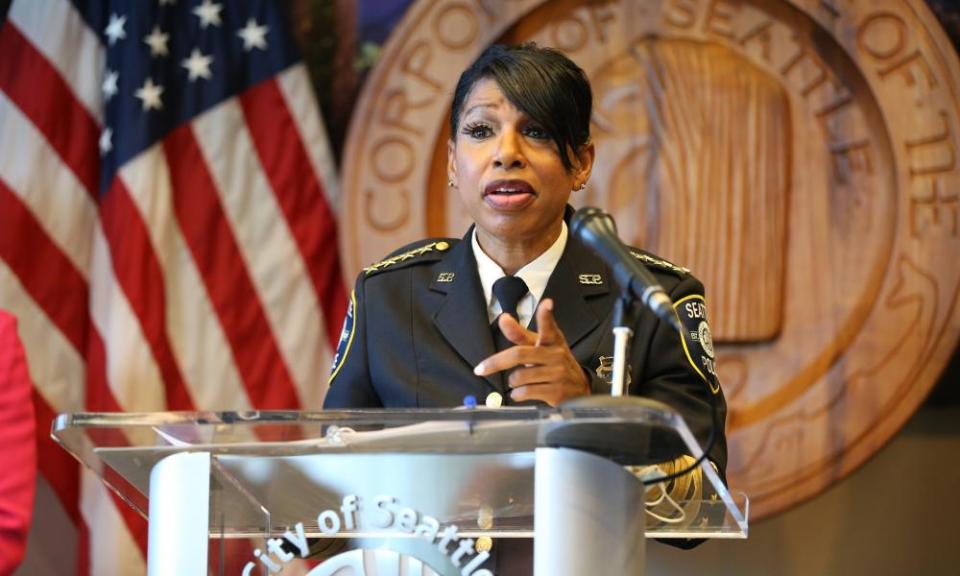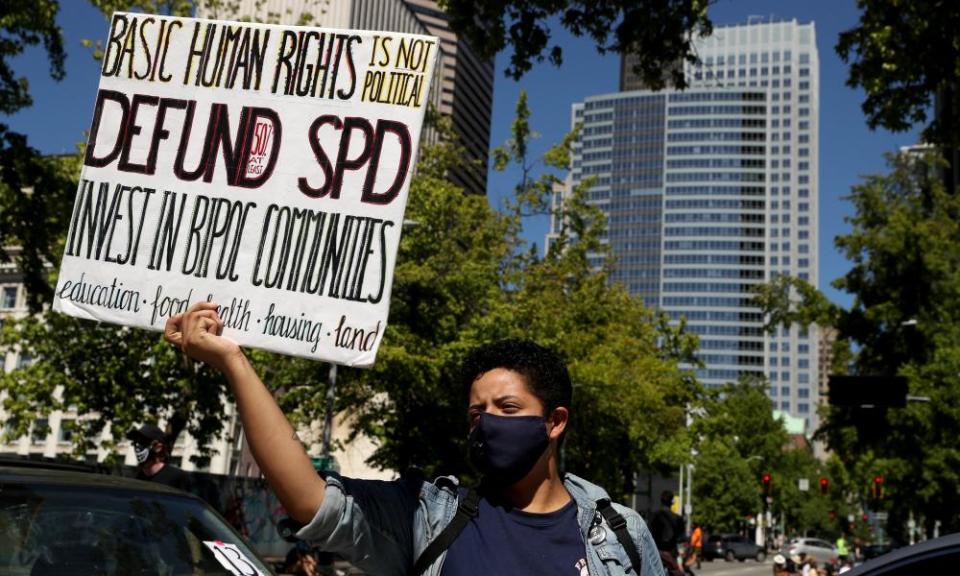Defund the police: can other cities learn from Seattle's stumbling blocks?
Seattle was on the verge of taking one of the most radical steps of late toward large-scale police reform of any city in the US just last month.
Related: What does 'defund the police' mean? The rallying cry sweeping the US – explained
In the wake of the police killing of George Floyd in Minneapolis in May, and widespread police brutality and anti-racist protests, a veto-proof majority of council members voiced their support for defunding the police, slashing 50% of the department’s budget.
But since then, they’ve faced a series of logistical roadblocks and clashed with other city leaders, and ultimately all but one of them have walked back their statements.
The council instead voted for a much smaller round of cuts, including reducing the salaries of Carmen Best, who is Seattle’s chief of police, and members of her command staff as well as trimming about 100 of the department’s 1,400 police officers.
Mere hours after the vote, Best, the first African American leader of the department who has held the position for only two years, announced her retirement.
“The idea of letting, after we worked so incredibly hard to make sure that our department was diverse, that reflects the community that we serve, to just turn that all on a dime and hack it off without having a plan in place to move forward, it’s highly distressful to me,” she said during a news conference last week. “It goes against my principles and my conviction and I really couldn’t do it.”
Best’s retirement will be effective 2 September. The Seattle mayor Jenny Durkan has appointed the deputy chief, Adrian Diaz, as the interim chief, but has said that in light of these cuts she would not start a national search for a replacement this year.
“I think we have to make it through the budget season, we have to see what the council is willing to do for this department in the long run, because right now nobody would know what job they’re applying for,” she said during the news conference.

The series of events have created much uncertainty over the future of Seattle’s police department. But it has also offered a raw look at the challenges and complexities involved in attempting to make changes of this magnitude to traditional law enforcement.
Seattle is not alone when it comes to working to revamp law enforcement. In Minneapolis, where Floyd, a Black man, was killed by a white officer, leaders are looking toward completely disbanding the police department, and last month New York opted to move $1bn out of the city’s police department.
Stephen Page, associate professor at the University of Washington’s Evans School of Public Policy and Governance, told the Guardian that what appears to be missing in Seattle, Minneapolis and New York is leaders transforming police reform from a rallying cry to a precise plan.
“None of those discussions in any of those cities at this point seem to be taking seriously these questions of what, exactly, are we doing if we’re not funding the police and how are we going to do it,” he said.
Last week, the Texas Tribune reported that the Austin city council unanimously voted to cut the city’s police department by one third, or $150m. The decision is expected to involve getting rid of funding for three police cadet classes, while boosting funding for social services and violence prevention programs.
In Seattle, one of the key challenges during this process has been collaboration. While city council members have said they’ve tried to work with the police chief and mayor during the defunding process, at last week’s news conference Durkan characterized the last few weeks as an “absolute breakdown of collaboration and civil dialogue”.
“It was both infuriating and deeply disappointing that the day after the chief stood in this room and criticized the council’s approach, offered her own approach and vision, the very next day they voted to slash her salary and the salaries of her whole team,” Durkan added.
The council voted to cut $10,000 from the police chief’s annual $285,000 salary. Best, who has been at the police department since 1992, said that did not influence her decision to leave.
The council president M Lorena González, council member Teresa Mosqueda and council member Tammy J Morales said in a statement that they were sorry to see Best go, and again stressed the importance of city leaders working together during the law enforcement reform process. But they also made it clear that this has in no way deterred their efforts.
“The council will remain focused on the need to begin the process of transforming community safety in our city,” the statement said. “This historic opportunity to transition the SPD from reform to transformation will continue.”

Isaac Joy, an organizer with King County Equity Now, one of the coalitions that has pushed to defund the department by 50%, said there is potentially a silver lining to Best’s departure: it presents an opportunity to find someone to lead the department who can be a “thought partner on listening and responding to the community’s demands, to divest from our police force, demilitarize our police force and start reinvesting and making Seattle a city that everyone can thrive in”.
He also stressed that the leader should also be Black.
Joy explained that’s because of the “police history, specifically as it relates to the enslaved, the Black population and that being the root of the police force. And so, in order to rectify and address that root, you do need Black leadership, you just, along with Black leadership, you need the support of the department, the support of the mayor, the support of the council.”
Earlier this month, the coalition released a blueprint for cutting the police budget and reinvesting that money into such groups as those developing alternatives to policing and providing housing for people in need.
On Monday, the council unanimously approved a resolution that includes a variety of goals for 2021, including creating a civilian-led department of community safety and violence prevention, and moving the city’s 911 dispatch out of the police department.
In the fall, they will begin work on the 2021 budget, which council members have said could see much more extensive budget cuts.
Dae Shik Kim Jr, an activist in Seattle and a director at the Grassroots Law Project, said while these initial budget cuts were much less than he and others fighting to defund the police department by 50% wanted, there could be built on. He referenced the fact that the council cut a police department team known for clearing homeless encampments.
He said: “Victories like that I think can’t be overlooked because at the end of the day those are the things we’re really fighting for.”
On Friday, though, Mayor Durkan announced that she had vetoed the council’s 2020 budget proposal, which includes the cuts to the police department. She said in a press conference that the budget didn’t “sufficiently look at the issues of public safety”. The council could override her veto with at least two-thirds support from members.

